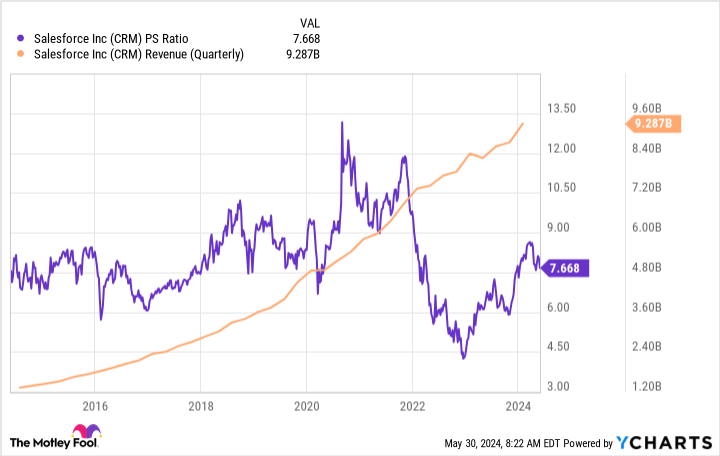Down 30%, Is Salesforce a Buy on the Dip?

A revenue growth deceleration might not be as bad as it looks.
Shares of Salesforce (CRM 7.54%) dropped about 18% when the market opened on Thursday, May 30. At recent prices, the stock is about 30% below the peak it set earlier this year.
The recent stock drop is a response to a disappointing first-quarter earnings report. While the company beat earnings expectations for the first three months of the year, management’s growth rate prediction was significantly slower than Wall Street analysts expected.
Is Wall Street and the stock market overreacting to a relatively minor growth deceleration? Here’s a closer look at the customer relationship management software provider to see if it could be a smart stock to buy on the dip.
Why Salesforce stock fell
On Wednesday, May 29, Salesforce reported fiscal first-quarter revenue that reached $9.13 billion, which missed Wall Street’s consensus expectation of $9.15 billion.
Investors were even more disturbed by the company’s forward outlook. Management said fiscal second-quarter revenue would land in a range between $9.2 billion and $9.25 billion. The average analyst who follows Salesforce expected management to predict $9.34 billion.
CRM PS Ratio data by YCharts
Salesforce’s stock closed above $271 per share before releasing fiscal first-quarter results and announcing a lower-than-expected growth outlook. That’s about 7.7 times trailing revenue, or roughly the same valuation it traded at a decade ago, when total sales were a tiny fraction of their present level.
If you’ve ever built a snowman, you understand the basic reason it’s much easier to grow a business with $5 billion in annual sales than it is to grow a business with $35 billion in annual sales: When large businesses trade for such lofty valuations, any sign of a slowdown can cause swift losses for shareholders.
Reasons to buy Salesforce on the dip
Salesforce’s top line is decelerating, but profits are way up. Free cash flow jumped 43% year over year to $6.25 billion in its fiscal first quarter that ended April 30.
Profits are outpacing sales because Salesforce has laid off roughly 10% of its staff since early 2023. Investors will be glad to know management retained employees working on artificial intelligence (AI) initiatives. The company recently updated Einstein Copilot, a conversational AI assistant that helps Salesforce clients manage daily marketing and merchandising tasks.
Now, Einstein Copilot can unify business and commerce data, which could drive demand from marketers and keep them coming back for more. Typical AI chatbots can’t access a company’s up-to-date information regarding territories, promotions, and inventory status, just to name a few drawbacks. By securely combining all of a company’s product and customer data, Einstein Copilot can help employees create new product detail pages and send personalized promotional emails to repeat customers in minutes.
As far as investors are concerned, the earnings growth a company can distribute to shareholders is a lot more important than revenue growth. The company returned $2.6 billion to investors in the form of share buybacks and dividend payments during its fiscal first quarter. A lot more could be on the way, too. Management expects operating cash flow to grow by 21% to 24% this year.
Time to buy?
As a multiple of sales, Salesforce’s stock price seems too high to be taken seriously. As a multiple of earnings, though, it’s not so overpriced. On the morning of May 30, the stock had fallen to $220 per share, which works out to about 22.2 times the midpoint of management’s adjusted earnings estimate for fiscal 2025.
A forward price-to-earnings multiple of 22.2 is more than reasonable for a company growing at Salesforce’s recent pace. Adjusted earnings per share are expected to climb more than 20% this year.
Salesforce recently initiated a quarterly dividend payment and at recent prices, it offers a 0.7% yield that you get to keep even if the stock gets decimated for some unforeseen reason. This probably isn’t the best stock you can buy right now, but adding some shares to a diversified portfolio isn’t a bad idea for most investors.
Cory Renauer has no position in any of the stocks mentioned. The Motley Fool has positions in and recommends Salesforce. The Motley Fool has a disclosure policy.




